Coursera is a giant among eLearning platforms. Its 9,000+ programs are delivered, and accredited, by globally revered institutions such as Stanford, Yale, IBM and Google.
But the reach and depth of Coursera’s offering means it can seem daunting to find the right course for you.
That’s why I’ve spent weeks researching and sampling the platform in order to compile this list of the best and most useful Coursera courses.
I’ve accounted for a range of factors such as free and paid-for content, whether to go for certification or not, length, instructor qualifications, popularity, student feedback and much more!
So, without further ado, let's get to it!
Best Coursera courses overall
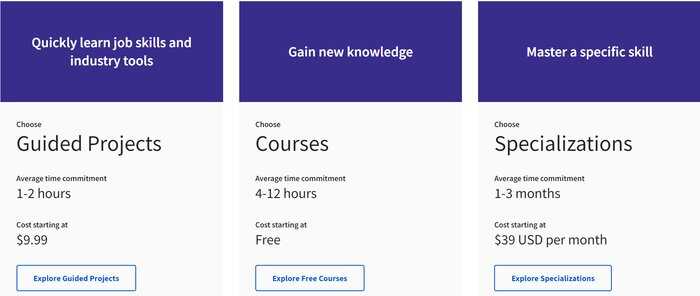
First, it’s crucial to understand that Coursera offers a range of very different course types. I summarize these below:
| Course type | Goal | Length |
| Course | Gain knowledge | 4-12 hours |
| Guided Project | Learn a practical skill | 1-2 hours |
| Specialization | Master a Skill | 1-6 months |
| Professional Certificate | Get job ready for a career | 2-7 months |
| MasterTrack Certificate | Master’s level courses | 4-7 months |
| Degree | Full Degree | 2-6 years |
Some of the best and most highly rated of each of these course types are:
- Course: Supervised Machine Learning: Regression and Classification Stanford University
- Guided Project: Chat GPT Playground for Beginners: Intro to NLP AI Coursera Project Network
- Specialization: Excel Skills for Business MacQuarie University
- Professional Certificate: Google Data Analytics Google
- MasterTrack: Social Work: Practice, Policy and Research Michigan University
- Degree: Bachelor of Science in Computer Science University of London
Of course, what’s best for you depends on what you’re interested in. And whether you’re looking to take a short course, professional qualification or full blown degree!
So to give you a broader idea of what’s on offer, I’ve reviewed a selection of course types in every one of Coursera’s 11 subject categories.
For more granular detail on how the platform works check out our Coursera review.
Top Coursera course by subject category
The 11 subjects covered by Coursera (along with my top picks in each) are:
- Arts and Humanities – Indigenous Canada (Course)
- Business – Excel for Business (Specialization)
- Computer Science – Python for Everybody (Specialization)
- Data Science – Supervised Machine Learning: Regression and Classification (Course) and Google Data Analytics (Professional Certificate)
- Health – Introduction to Psychology (Course)
- Information Technology – IBM Cybersecurity Analyst (Professional Certificate) and Chat GPT Playground for Beginners: Intro to NLP AI (Guided Project)
- Language Learning – Learn to Speak Korean 1 (Course)
- Math and Logic – Introduction to Mathematical Thinking (Course)
- Personal Development – The Science of Well Being (Course)
- Physical Science & Engineering – Introduction to programming the Internet of Things (Specialization)
- Social Sciences – Social Work: Practice, Policy and Research (MasterTrack)
Best Courses on Coursera
For each of the mini reviews below I’ve indicated the course type to give you a clear idea of how much time you might need to commit to each one.
1. Supervised Machine Learning

Course type: Course | Category: Data Science | Provider: Stanford University | Rating:4.9/5 | Length: approx 1-4 weeks | Level: Beginner
Get to grips with key AI concepts and develop practical machine-learning skills in this beginner-friendly program by AI visionary Andrew Ng. Ng’s many achievements include founding DeepLearning.AI and the Google Brain Team.
Given this–and the fact he’s an adjunct professor at Stanford and author of 100+ papers on machine learning–he’s more than qualified to deliver this course.
This, combined with its 4.9 rating and excellent balance of theory and practice, is why it’s at the top of our best Coursera courses list. Even better, you can take it for free (without certification). And if you enjoy it, you can upgrade to take the full Machine Learning Specialization.
You will learn:
- What learning is and how machines do it without explicit programming
- The most effective machine learning techniques and how to practically apply them to new problems.
- To build machine learning models in Python using NumPy & scikit-learn
- To set up and train supervised models for prediction & binary classification tasks
See also our Best AI courses review.
2. Introduction to Psychology

Course type: Course | Category: Health | Provider: Yale | Rating:4.9/5 | Length: 1-3 months | Level: Beginner
This course provides a thorough grounding in the scientific study of thought and behavior. It tackles fascinating topics such as fears, dreams, prejudices, perception, learning and persuasion. It's a comprehensive and fascinating introduction to the study of the greatest question of all: What does it mean to be human?
Delivered by prolific author and award-winning professor Paul Bloom from Yale University, “insightful” and “inspirational” are commonly used to describe it. Bloom’s enthusiastic and down-to-earth approach garners much praise and makes this complex topic both accessible and exciting.
And if you’re not concerned about certification, you can take it for free!
You will learn:
- Foundational psychological theories and findings in psychology (including Freud and Skinner)
- About research into development and language
- How language is learned, animal communication, language processing, and the relationship between language and thought.
- How we perceive the world, how attention works and how we record experiences in memory
- Key elements of social psychology
Features #2 in our best Psychology courses review.
3. Excel Skills for Business

Course type: Specialization | Category: Business |Provider: Macquarie University | Rating:4.9/5 | Length: 3-6 months | Level: Beginner
This Specialization starts with Excel essentials and becomes incrementally more challenging as it advances to more complex skills.
It’s led by Nicky Bull. Nicky’s a corporate trainer, consultant and lecturer with over a decade of experience designing and delivering educational programs. She’s also received the Coursera Outstanding Educator Award for Student Transformation in 2018.
As well as being in our top selection here, Excel Skills for Business features prominently in our selection of 10 best Excel courses. It's probably one of the most useful Coursera courses on the platform.
Excel Skills for Business has garnered a massive number of positive reviews and course takers on Coursera. With over 300,000 enrollments and a rating of 4.9 out of 5 from thousands of reviews, it is one of the most popular and well-regarded Excel courses available. Many students praise its comprehensive coverage and practical applications, which stand out when compared to other Excel courses on Coursera.
For instance, compared to the ‘Excel Essentials for Data Analytics' course, which also has positive feedback, ‘Excel Skills for Business' offers a broader curriculum that caters to both beginners and intermediate users. Similarly, while ‘Data Visualization with Advanced Excel' focuses more narrowly on visualization techniques, ‘Excel Skills for Business' provides a solid foundation across various essential Excel functionalities, making it a more versatile choice for many learners.
These distinctions highlight why ‘Excel Skills for Business' remains a top choice for those looking to build a strong proficiency in Excel for business applications.
You will Learn:
- How to apply Excel skills and techniques to solve a range of business problems
- Get comfortable navigating the Excel for entering, manipulating and formatting data
- Use formulas and functions to perform calculations on data and automate choices
- Analyze data and present the results in a variety of ways
- Create easy-to-use spreadsheets
- Validate data, find and correct errors.
- Design more sophisticated spreadsheets
- Perform complex calculations and operations
- Use advanced Excel features and techniques confidently
4. Learn to Speak Korean 1

Course type: Course | Category: Language Learning |Provider: Yonsei University | Rating:4.9/5 | Length: 1-3 months | Level: Beginner
Yonsei University is one of the top ranking institutions in South Korea. And Sang Mee Han, the instructor, has been teaching Korean language to non-native Korean speakers since 1989.
Her course offers a perfect balance of listening, speaking, grammar and writing practice. It is organized through themes, focusing around activities or things that you will encounter when traveling to Korea. So it is especially great if you are planning on traveling, living or studying in Korea.
As well as ranking prominently in this article, it features second on our best Korean language courses review. And, as with all Coursera single courses, it can be taken free (without certification).
Korean has been chosen for this list due to its growing popularity as a second or third language, particularly among young people fascinated by Korean culture, music, and dramas. In the US alone, the number of students learning Korean has been steadily increasing, reflecting a global trend towards embracing the language alongside its vibrant cultural exports.
You’ll learn to:
- Introduce your friends and describe their actions, appearance and personality
- Talk about your hometown, express how it looks and how it makes you feel
- Talk about food, describe taste, order food and drinks, inquire about restaurant menus and order specific portions of food
- Suggest something to do together
- Go shopping in Korean, talk about different stores and shopping areas in South Korea, make purchases in stores using Korean vocabulary and sentence structure
5. The Science of Well-Being
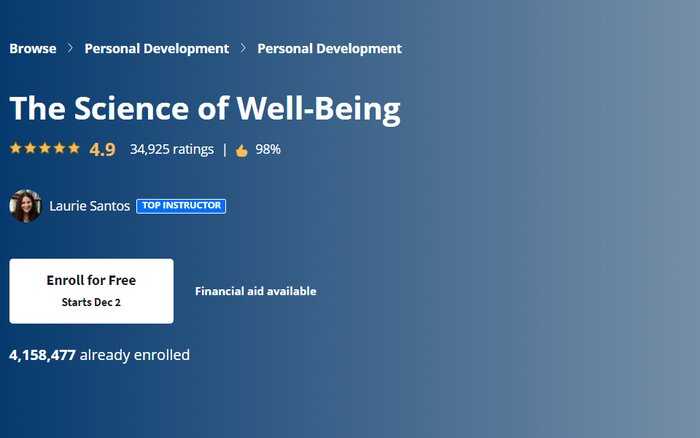
Course type:Course | Category: Personal Development |Provider: Yale | Rating:4.9/5 | Length: 1-3 months | Level: Mixed
Laurie Santos is a Professor of Psychology, host of the Happiness Lab podcast and director of the Comparative Cognition Laboratory at Yale. So it’s safe to say she’s more than qualified to deliver this course. You’ll have the opportunity to take on a series of challenges designed to increase your happiness and build more productive habits.
Given that this course is delivered by a Yale Professor of Psychology and can be taken for free (if you don’t want the certificate), I can’t see anyone losing out by giving it a go.
You Will Learn:
- Why our ideas about what will make us happy often turn out to be wrong
- How to overcome annoying aspects of the mind that misdirect us
- Practical steps you can take to make a positive change and be happier and more productive
6. Python for Everybody

Course type:Specialization | Category: Computer Science | Provider: Michigan University | Rating:4.8/5 | Length: 3-6 months | Level: Beginner
Anyone new to coding will get huge value from this Specialization. You need nothing more than a little computer experience and the most basic of math as it starts at ground level and builds gradually in difficulty. The instructor is Professor Dr Charles Severance who teaches an array of technology related courses at the University of Michigan.
With its structured, incremental approach to mastering one of today’s most in-demand skills, it deserves to be highly placed on our best list. And its impressive course rating bears this out. Along with the five course units this specialization contains a hands-on project that leads to an accredited certificate.
The “Python for Everybody” course on Coursera was last updated in May 2020. This course is highly recommended for beginners and serves as an excellent foundation in Python programming. For further learning, adding a course like “Python Data Structures” or “Using Databases with Python,” both part of the same specialization, can enhance your skills significantly.
You will Learn:
- Python fundamentals
- To install Python and write your first program
- Use variables to store, retrieve and calculate information
- Utilize core programming tools such as functions and loops
- How to use Python’s built-in data structures such as lists and dictionaries to perform data analysis
- Methods for using Python to access data from the web
- Techniques for using databases in Python
Ranks TOP in our best Python courses review
7. The New School Parsons’ Fashion Design course
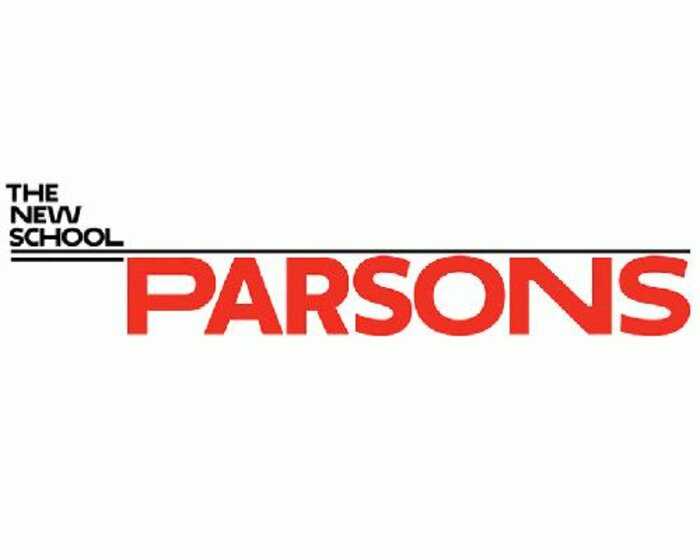
Course type:Course | Category: Business | Provider: The New School Parsons | Rating:4.6/5 | Length: 1-3 months | Level: Intermediate
The New School Parsons is a world-leading fashion university located in the heart of New York City. Their graduates include Tom Ford, Alexander Wang, and many other names that you definitely know. This is their online course on fashion design, providing you with an opportunity to learn from the professors of a top university in the fashion industry.
It’s a saturated, intense course that will give you top-tier knowledge in the fashion design and business industry and an outstanding way to improve your knowledge and qualifications. It rates highly not only here, but also in our round up of best fashion design courses. If you’re not concerned about certification, you can take it for free.
What you’ll learn:
- An understanding of the foundation of the fashion design process
- Technological developments in fashion design and the future of the fashion industry
- To work with new technology and artisanal design and craftsmanship
- To build your brand through the aesthetics and materials
- How to observe fashion from the socio-political point of view and forecast fashion trends depending on the world around you
- How to be environmentally friendly while staying creative
8. IBM Cybersecurity Analyst
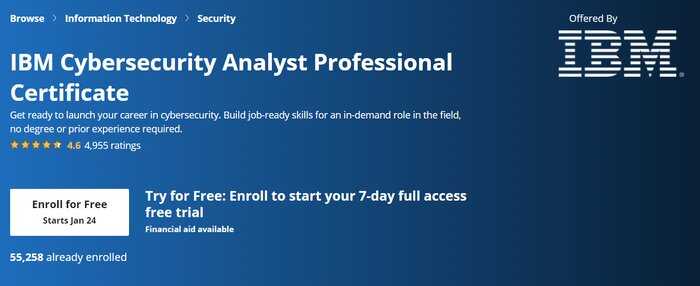
Course type:Professional Certificate | Category: Information Technology | Provider: IBM | Rating:4.6/5 | Length: 3-6 months | Level: Beginner
IBM Cybersecurity Analyst provides everything you need to get job-ready for a role in the Cybersecurity industry. It includes 7 course units, assessments, a real-world security breach hands-on collaborative project, and access to virtual labs, sites and industry tools.
Completion also means you are eligible to earn the Introduction to Cybersecurity Tools & Cyber Attacks IBM digital badge. And that’s why it made it to our list of top Coursera courses.
IBM certifications are highly regarded in the IT industry and validate your skills and knowledge in specific IBM technologies and solutions. Completing this professional certificate not only equips you for a cybersecurity analyst role but also makes you eligible for the globally recognized IBM digital badge, enhancing your professional credibility.
You will Learn:
- Fundamental Cybersecurity concepts and terms
- About analytic tools including data protection; endpoint protection; SIEM; and systems and network fundamentals
- Key processes and frameworks
- Basic network security and vulnerabilities
- Defence tactics, Incident response protocol and forensics with real world cybersecurity case studies
- Develop skills via hands on experience with industry specific and open source Security tools
9. An Introduction to Programming the Internet of Things

Course type: Specialization | Category: Physical Sciences and Engineering | Provider: University of California | Rating:4.7/5 | Length: around 3-6 months | Level: Beginner
Learn about the role and importance of the Internet of Things (IoT), the components of a typical IoT device, and what the future holds for this technology. Then apply all the skills you learn in a project to build your own microcontroller-based embedded system that you can showcase to future employers.
Ian G. Harris (BS, MS, PhD) is professor of computer science at UCI with a wide range of related research interests. This is a unique opportunity to learn about a technology that is enjoying explosive growth and transforming our world.
You will learn:
- What the IoT is, the trends that have led to it and its impact on society
- What an embedded system is and its key components and features
- To understand networking and network protocols
- How to deploy the Arduino platform and C for building devices that sense and control the physical world around them
- When, how and why to use different sensors types
- How to use the Raspberry Pi and Python to design and develop fun and practical IoT devices
10. Indigenous Canada

Course type:Course | Category: Arts and Humanities | Provider: University of Alberta | Rating:4.8/5 | Length: 1-3 months | Level: Beginner
Indigenous Canada explores the historical and contemporary experiences of Canada’s native peoples. Using a range of resources such as maps, artifacts, graphics and imagery, It explores how Canada’s aboriginal societies traded and interacted with each other prior to settlement – and the subsequent impact of that settlement.
I’ve added it to the list partly because it's a rich, deep and layered experience that provides a great foundation for garnering an appreciation of indigenous cultures, perspectives and worldviews. But also because it illustrates just how extensive and varied the library of offerings on Coursera is.
As with all Coursera courses, it can be taken for free with an additional charge if you require certification.
You will learn about the:
- Significance of storytelling in Indigenous societies
- Worldviews of the Inuit, Nehiyawak, Kanien:keha’ka and Tlingit peoples
- Trading systems between Indigenous peoples prior to European contact
- Impact of the fur trade
- Different perspectives of indigenous peoples and settlers towards treaty making and legal traditions
- Ways in which the Indian Act contributed to assimilation
11. Chat GPT Playground for Beginners: Intro to NLP AI Coursera Project Network
Course type: Guided Project | Category: Information Technology | Provider: Coursera Project Network | Rating:4.8/5 | Length: approx 2 hours | Level: Beginner
Guided projects provide a split screen workspace in which you complete a project with step-by-step video guidance.
Your tutor, Rudi Hinds, is a software engineer, full-stack developer and technical instructor at Coursera. His guided project walks you through the process of working with the fundamental operations of ChatGPT without any coding experience required.
The course “Chat GPT Playground for Beginners: Intro to NLP AI” was last updated on February 3, 2025. If you're looking for alternatives, consider exploring “Prompt Engineering with GPT: Programming for Custom Content” or “Generative AI: Prompt Engineering Basics” on Coursera for more advanced and specialized learning in prompt engineering.
You will:
- Receive an introduction to ChatGPT and understand how it works
- Deep dive into Tokens and Pricing
- Explore, and get to grips with, ChatGPT parameters
- Learn to guide AI Responses to a simulated chatbot
- Create an AI-powered Health Assistant and simulate a conversation between a family doctor and a patient.
12. Introduction to Mathematical Thinking
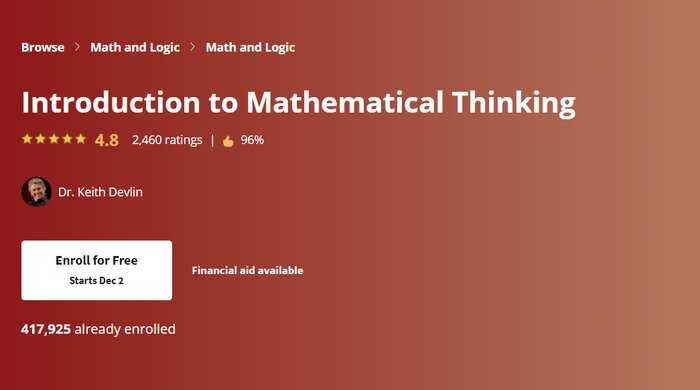
Course type:Course | Category: Math and Logic | Provider: Stanford | Rating:4.8/5 | Length: around 1-3 months | Level: Intermediate
This mathematical thinking course is taught by Dr. Keith Devlin, co-founder of the Stanford University Human-Sciences and Technologies Advanced Research Institute. It provides valuable insight into the mystery behind mathematical theorizing from one of the leading lights in the industry.
Logic, and the ability to critically evaluate a situation, are crucial in today’s world. So we strongly recommend this course to students of intermediate level interested in expanding their understanding of what ‘math’ is and how it became ‘math’. It’s also included in our list of best Math Courses.
It can be taken for free if you do not want to go for certification.
What you’ll learn:
- How mathematicians think – discover the powerful cognitive process perfected and developed over hundreds of years
- Familiarity with formalized language in mathematics
- To analyze the purpose and use of mathematical languages
- The history behind calculus creation and how important linguistic definition can be in math
- Number theory
- Methods of developing a rigorous foundation for calculus
- How to solve problems using critical and mathematical thinking
See also our best online Math course review.
13. Social Work: Practice, Policy and Research
Course type:MasterTrack | Category: Social Sciences | Provider: University of Michigan | Rating:4.7/5 | Length: around 4 months
This course has been selected for our list as it is delivered by the University of Michigan – the #1 school for social work in the US. So if you have a strong interest in pursuing a career in social services this is the course for you. Even if you have no relevant experience. It includes six rigorous and linked courses, live sessions with instructors and peers, flexible and personalized learning, quizzes, assignments, collaborative projects and case studies.
Passing this MasterTrack successfully results in a University of Michigan Certificate and allows you to complete the full Masters for 45 instead of 60 credits (though to continue to the full Masters some human service experience will be necessary).
Learn how:
- Social workers effect positive change with individuals, families and communities
- Key research, knowledge, policy and frameworks guide social work practice
- Social work policy has evolved over the last century
- To understand the connection between social work and social justice and how to use a social justice lens
- To appreciate the different roles of social workers in a range of settings
14. BSc Computer Science

Course Type: BSc full degree | Category: Computer Science | Instructors: Tutors from Goldsmiths (University of London) | Length: 3-6 years
This is a chance to open the door to a career in technology with a globally recognized university. One of the main reasons I picked it is the flexibility it offers for you to specialize in 1 of 7 cutting-edge topics: Machine Learning & AI, Data Science, Web & Mobile Development, Physical Computing & the Internet of Things, Games Development, Virtual Reality or User Experience.
It’s a great mix of theory and practice with a project-based approach that will nurture technical and transferable skills. Though there is an option to attend classes in person, tuition can be fully online, with academic support and feedback as well as access to student forums.
Compared to other IT courses on this list like the IBM Cybersecurity Analyst and the Python for Everybody Specialization, the BSc Computer Science offers a more comprehensive and in-depth academic experience. While the others focus on specific skills or job roles, this degree program provides a wider foundation in computer science principles and allows for specialization in various cutting-edge fields.
Learn how to:
- Master in-demand computing skills
- Solve complex problems
- Sharpen your innovation and creativity
- Develop technical and transferable skills
- Shine in one of 7 specialist fields (for example AI, Machine Learning, Games Development, etc.)
How to find the best courses on Coursera
There are quite a few ways to navigate Coursera to find courses. The two most straightforward are using:
- Search if you know the subjects and topics that most interest you
- What we Offer if you want to explore the different learning paths on Coursera
Thorough research is crucial when selecting the right Coursera course. Start by reading student reviews directly on the course page, paying attention to both positive and negative feedback. Investigate the instructor's credentials, experience, and teaching style. Compare the chosen course with similar offerings on Coursera to gauge the breadth and depth of content.
Expand your research beyond the platform by exploring third-party user-generated content platforms like Reddit and Quora, where you can find candid discussions and recommendations from past learners. This multifaceted approach ensures you have a well-rounded understanding of the course before enrolling.
What we Offer
I found this the most helpful way to explore the different options on Coursera. It meant I knew in advance the approximate cost, length of course and goal of each option before taking a closer look.
Just scroll the very bottom of any screen and click on the What We Offer option:

You’ll then see the following, allowing you to explore all the different options according to your goal, time commitment and budget:
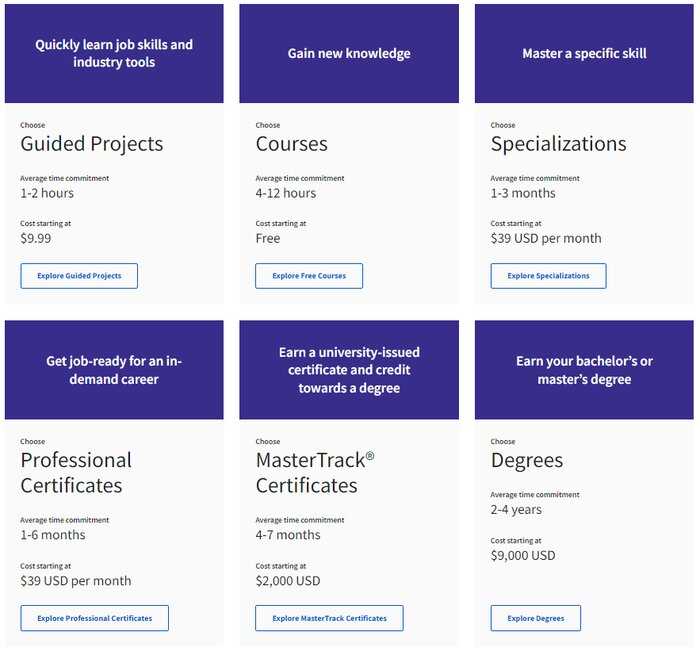
You can also use the search function and filter your searches.
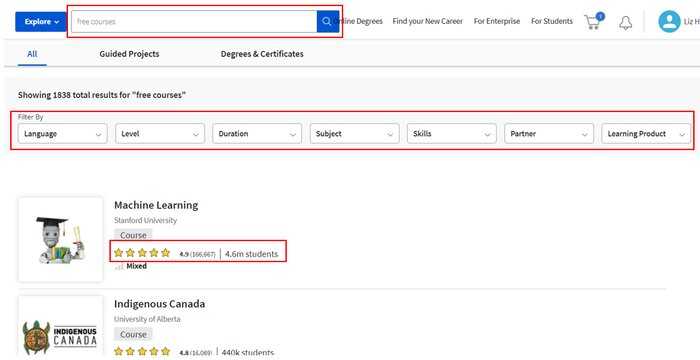
Whether you use Search or What do We Offer to explore, courses will be listed with the most popular and top rated courses displayed first.
When you find a course you like, click on Enroll to find out more details and read student reviews.
How much does Coursera cost?
In summary:
- Coursera Courses can be taken without certification for free. With certification they cost from $49. You can start a course for free and pay later if you decide you would like a certificate
- Guided Projects start at $9.99
- Specializations and Professional Certificates from $39.99 a month
- A Coursera Plus subscription is $399 per year
- Full degrees start at $9,000
A Coursera Plus subscription gives you unlimited access to Courses, Guided Projects, Specializations and some Professional Certificates for as long as your subscription is active.
Coursera Plus costs either $59 monthly, or $399 up front for the year (an annual saving of $309 over the monthly cost).
This works out to just over $1 a day to be taught by the world’s best and brightest which is amazing value and a sound investment in you and your future.
For more granular detail check our article Coursera cost. And for the latest discounts (which are rare but do occur) check here.
Coursera free trial
There are many ways to experience Coursera for free. So you can sample much of what’s on offer without spending a cent.
There are:
- 1,800+ Coursera free courses that you can take in full without certification
- Individual Specialization units that can be audited for free
- Seven day free trials with:
- Coursera Plus monthly subscription
- Specializations
- Professional Certificates
As well as this, Coursera offers 14 day money back guarantees on most of its products. To find out how to get as much content as possible or free, check out our article: Coursera pricing, clearly explained.
How to get the best value from Coursera?
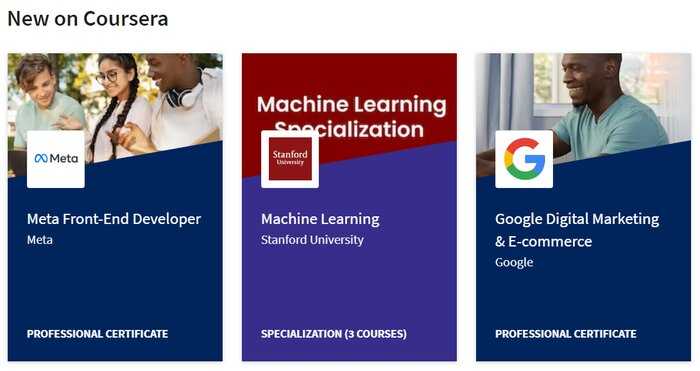
To get the most value out of Coursera you need to take time to find the right fit – use our guide above to find the right courses, check out the content and read reviews.
From then on, the key to getting good value is to be disciplined:
- Make learning a habit. Spread out your learning sessions for better outcomes.
- Start the way you mean to go on. Keeping up to date with deadlines and routines at the start of a course, makes it twice as likely you’ll stay engaged and get finished.
- If you’re paying for a course on a monthly basis, the more you stick to a learning routine, the quicker you'll get through it and save money. Of course, don’t forget to cancel your payment when you have finished!
- If you go for Coursera Plus subscription, plan to take as many courses as possible to get maximum value.
- Participate with other learners through discussion forums to keep you engaged and on task.
Our methodology
I’ve spent a lot of time navigating every corner of Courser’s platform to investigate the range, quality and cost of what’s on offer.
I also sampled several specific courses. This included topics I felt confident in which helped me gauge the quality of the teaching. And courses I knew little or nothing about to see if claims that no prior experience was necessary were backed up by good introductory content and incremental teaching that kept me engaged and learning.
Conclusion
Our top picks for the best courses on Coursera are Supervised Machine Learning with Stanford and Introduction to Psychology with Yale. Both have extremely high ratings, are offered by the world’s most prestigious universities and can be taken for free.
Stanford’s machine learning course has been updated and expanded from an earlier, massively popular programme. It now forms part of a broader specialization. So if you enjoy it you can upgrade and really get to grips with the latest in AI.
And Yale’s psychology course is an accessible, imaginative and fun exploration of that oldest of all questions, what does it mean to be human?
That said, Coursera has thousands of very different course types across 11 varied categories. Prior to reading this article it might have seemed daunting to find the best course for your specific needs. But armed with the knowledge we’ve provided, you should now be able to squeeze every ounce of value out of this megalith amongst eLearning platforms.
And if you’re still feeling cautious, just remember that all of Coursera’s 1,800 courses (not guided projects, specializations or professional certificates) can be taken in full for free. You need only pay if you require certification. That’s 1,800 opportunities to experience what the platform has to offer with no risk.
Best Coursera Courses – Frequently Asked Questions
What is the best Arts and Humanities course on Coursera?
Indigenous Canada (Course)
What is the best Business course on Coursera?
Excel Skills for Business (Specialization)
What is the best Computer Science course on Coursera?
Python for Everybody (Specialization)
What is the best Data Science course on Coursera?
Supervised Machine Learning (Course) and Google Data Analytics (Professional Certificate)
What is the best Health course on Coursera?
Introduction to Psychology (Course)
What is the best Information Technology course on Coursera?
IBM Cybersecurity Analyst (Professional Certificate) and and Chat GPT Playground for Beginners: Intro to NLP AI (Guided Project)
What is the best Language Learning course on Coursera?
Learn to Speak Korean 1 (Course)
What is the best Math and Logic course on Coursera?
What is the best Personal Development course on Coursera?
The Science of Well Being (Course)
What is the best Physical Science & Engineering course on Coursera?
Introduction to Programming the Internet of Things (Specialization)
What is the best Social Sciences course on Coursera?
Social Work: Practice, Policy and Research (MasterTrack)
What is the best coursera course for the job market in 2025?
For the 2025 job market, consider these in-demand Coursera courses:
Google IT Support Professional Certificate: Launch a career in IT with no prior experience.
IBM Full Stack Cloud Developer Professional Certificate: Gain skills in cloud development.
Google UX Design Professional Certificate: Learn in-demand UX design principles and tools.
IBM Applied AI Professional Certificate: Explore AI applications across industries.
Meta Back-End Developer Professional Certificate: Specialize in back-end web development.
Google Data Analytics Professional Certificate: Develop data analysis skills for various roles.
These courses offer practical skills and professional certifications that are highly valued by employers across various sectors, increasing your chances of landing a rewarding job in 2025.
What type of courses are most popular on Coursera?
Coursera's most popular niches include:
Technology: Courses in Python, web development, IT support, and cybersecurity are consistently in high demand.
Data Science: Machine learning, data analysis, and AI courses attract learners seeking to enter this growing field.
Business: Courses on leadership, marketing, finance, and project management remain popular for career advancement.
Personal Development: Topics like well-being, mindfulness, and communication skills draw a broad audience.
Health: Courses on nutrition, psychology, and public health appeal to those interested in wellness.

Liz Hurley has 30+ years of high school teaching experience and is one of our senior writers here at Learnopoly.
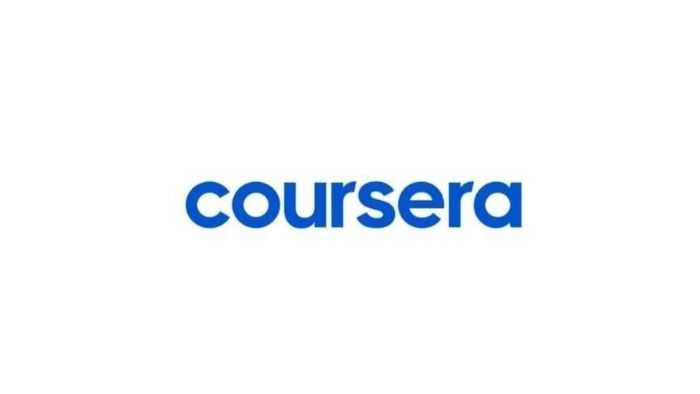

Thank you Liz Hurley and Learnopoly for a VERY comprehensive introduction to Coursera. 1800 FREE courses!
I’ve looked at Coursera previously but was turned away by the cost due to the financial constraints imposed by retirement. Happily you have corrected my previous misconceptions. Thank you again! M.
Thank you so much Jon! It is always lovely to get positive feedback. Coursera’s pricing structure is a little confusing but there are still plenty of things you can access for free if you know where to look. Our ‘best of’ reviews always suggest ways to access learning for free. You could also check out our review of edX which is a similar platform to Coursera for even more free goodies. https://learnopoly.com/edx-review/ Good luck with your learning and thanks once again!
I am continuously browsing online for articles that can assist me. Thank you!
You’re very welcome! We’re glad you found our content helpful. Keep exploring, and we hope to continue providing valuable insights for you. Happy reading!
When I originally commented I clicked the -Notify me when new comments are added- checkbox and now each time a comment is added I get four emails with the same comment. Is there any way you can remove me from that service? Thanks!
Thank you for reaching out! We’re sorry for the inconvenience. Unfortunately, we don’t have direct control over notification settings, but you can try the following steps:
Look for an “unsubscribe” or “manage subscription” link in one of the notification emails.
If that doesn’t work, check your account settings (if applicable) to adjust your notification preferences.
If you’re still experiencing issues, let us know, and we’ll do our best to assist you further.